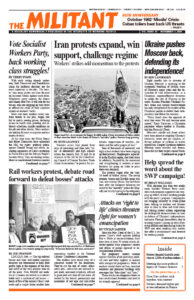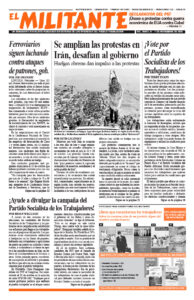WASHINGTON — Some 30 people, many originally from Africa, came together here Oct. 17 to discuss the political legacy of Thomas Sankara, the central leader of the 1983-87 revolution in Burkina Faso and the country’s president. This is the 35th anniversary of his assassination in a counterrevolutionary coup.
“What was accomplished by Sankara and his comrades in four years was a revolution, to answer the basic needs of its people for water, basic sanitation, food, for self-reliant development. He looked to the Cuban Revolution as his model. This is why he had to be stopped,” said Aziz Salome Fall, welcoming participants to the meeting held at Howard University. Fall is coordinator of the International Campaign for Justice for Sankara. Along with Sankara’s family, he has been campaigning for decades to keep Sankara’s ideas alive and to bring his assassins to trial.
In 1983, Sankara led a mass uprising that established a popular and democratic revolutionary government. With his leadership, workers and peasants began to use their new state power to fight hunger, disease, illiteracy and economic backwardness imposed by imperialism in the former French colony, one of the poorest countries in the world. The revolutionary government carried out campaigns to draw women into social and political life, increasing their self-confidence. Three million children were vaccinated against common diseases. A far-reaching literacy campaign was organized.
Sankara spoke on behalf of the oppressed and exploited worldwide and stood out among the leaders of struggles for national liberation in Africa because he was a communist.
Acting on the interests of the enemies of the revolution — the propertied classes of Africa, and the world’s capitalist powers, above all imperialist France — Blaise Compaore, who had participated in the revolution and served as minister of justice, led a military coup and organized Sankara’s murder on Oct. 15, 1987. In a victory for Sankara’s legacy, a military court in Burkina Faso found Compaore and a handful of his collaborators guilty of Sankara’s death on April 6. Compaore, who lives in exile in neighboring Ivory Coast, was tried in absentia.
Three of Sankara’s brothers and sisters — Paul, Pascal and Pauline, and Sankara’s son, Philippe — participated in the meeting. “It’s important that after 35 years of fighting for justice, a victory was won in a courtroom in Burkina Faso,” said Paul Sankara. “After the 2014 uprising, when the Burkinabe people’s conviction, courage and honor drove Compaore from power, things could not be as they were before.”
In a wide-ranging discussion after the presentation, participants spoke about the importance for workers, peasants and young people across Africa and worldwide to study and learn what Thomas Sankara said and did.
“I’d like to thank the Socialist Workers Party and Pathfinder Press who worked to publish the first book in any language of this great revolutionary leader, Thomas Sankara Speaks,” said Madnodje Mounoubai, who chaired the meeting.
Mounoubai, a Burkinabe who lives in Silver Spring, Maryland, was Sankara’s translator when he spoke in Harlem in 1984. The speech is in the Pathfinder book under the title, “Our White House Is in Black Harlem.” The talk was screened at the meeting.

